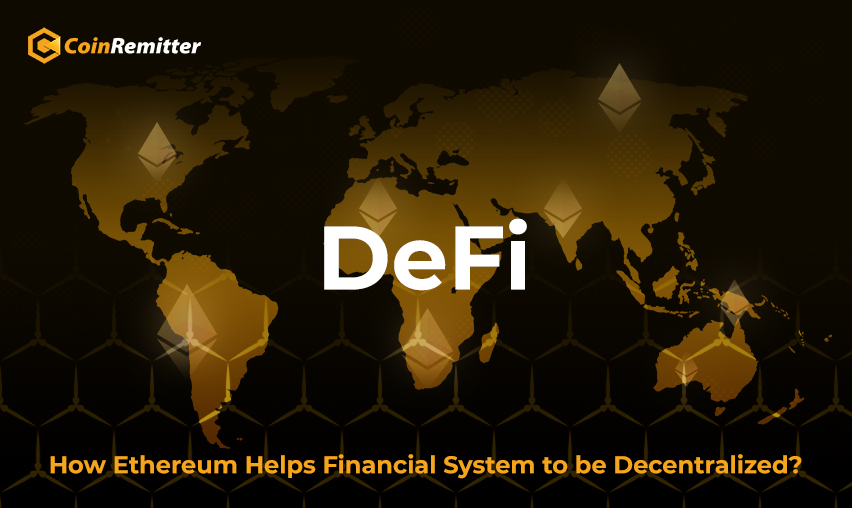In recent times, Ethereum has become the most widely known platform based on blockchain technology. Furthermore, its aim is to create an alternative protocol that will create decentralized applications. Ethereum makes highly programmable digital money, allowing distributed users to execute code in the form of smart contracts.
In addition to speculation and value storage, Ethereum allows many aspects of traditional finance to run on open networks, with on- and off-ramps allowing for greater compatibility with fiat currencies, other cryptocurrencies, and conventional resources.
To understand it briefly…
You must have an idea of DeFi (Decentralized finance). Moreover, it is a combination of traditional banking services with decentralized technologies like blockchain.
Many of us now have a well understanding of ethereum, bitcoin, and other cryptocurrencies. However, there are very limited people out there who do not know that it can also be helpful to use it as a decentralized system.
Decentralized finance Ethereum is one of the identities that assisted to make the essence of mainstream open finance.
Ethereum can also be used as a portal for payment, simply implementing the ether payment gateway helps to expand the business and attract potential customers.
What’s the Importance of DeFi?
DeFi continues to play an important role in financial sector development for a variety of reasons. Moreover, the potential for expanding the global economy is huge.
As a result, analysts see this sector as one of the crypto space’s most important currently under development.
It is easy to recognize that commitment to developing a DeFi ecosystem. Certainly, it is the fastest-growing blockchain sector.
Moreover, since this period depicts the start of this stage of integration, the market now has the unique opportunity to see a completely new industry blossom.
Know the Difference Between Traditional vs Decentralized Finance
Decentralized Finance (DeFi) is just an advanced version of the finance system with the same root of work in obtaining and giving capital.
Here, we’ve outlined some of the major differences:
- A centralized governing body manages conventional financial institutions. Moreover, DeFi apps, run on smart contracts, ensuring that dApps operate without any human barrier.
- A public blockchain is permitless, that means the ecosystem doesn’t have gatekeepers to keep track of who gets to create dApps and who doesn’t. However, DeFi dApps can be developed and used by anyone.
- The dApps is another form of blockchain application used in the DeFi environment, and it has been built from day one to function globally. Regardless of the geographical area to which you belong, the DeFi network and service connectivity are the same.
- The app is based on a public blockchain and its code is transparent and open for everyone to see. Moreover, this is in sharp contrast to mainstream financial institutions. Though, in a DeFi ecosystem, everyone can help make the software bug-free & smooth.
- The fact that decentralized funding is more open and transparent than conventional finance, is still a factor. Moreover, the lack of entry barriers means anyone with programming skills can participate in building financial services and tools alongside public blockchains.
What Decentralized Applications Offer?
Ethereum dApps communicate with the blockchain to create entirely new ways of quality exchange and collaboration on the network.
Moreover, DeFi users can borrow, lend, exchange, invest, and make payments nowadays without the need to serve as an intermediary for a financial institution. Instead, it replaces the position of financial institutions with decentralized smart contract protocols.
So, let’s understand what are the services that DeFi offers.
Lending:
Crypto holders can lend on decentralized lending platforms to earn additional income via interest charges paid by borrowers on their holdings.
However, this is an enticing option for lenders, as they are able to earn relatively low-risk interest on their current holdings without entrusting their private keys to a centralized third party service.
Here are the dApps that provide the lending facilities.
Investing:
Investment tokens are in accordance with SEC regulations on financial securities. While this module won’t dive into regulation and compliance, the simple thing to understand is that these tokens provide the token holder with an array of financial rights.
Payments:
DeFi payment applications, protocols, and solutions concentrate on developing an open financial ecosystem that addresses institutional requirements as well as underbanked and unbanked populations.
Insurance:
Insurance is a procedure or agreement whereby a company offers compensation assurance for a defined loss, damage, illness, or death in return for a premium payment.
Prediction Markets:
Prediction markets make it easier to exchange event securities. They have been around since the 1990s and are also sometimes referred to as markets for knowledge, futures ideas, and markets for decision making.
Synthetics:
A synthetic is a financial asset that imitates other tools. In other words, any financial instrument’s risk-reward profile can be simulated using a mixture of other financial instruments.
DeFi Dashboards:
It is a Dashboard that assists you to analyze and track all of your Decentralized Finance activity. Furthermore, add an Ethereum address to track! It lets you track your activity across the various dApps that you are using.
Tokenized Securities:
Security tokens are virtual assets that are subject to federal security rules. Moreover, in layman terms, to simply, the intersection between digital assets (tokens) and conventional financial products.
The Bottom Line:
To sum up, this blog comprises every information regarding the role of Ethereum that helps the financial system to be Decentralized. Moreover, DeFi differs from the traditional finance system by providing value, security, and much more.
At Coinremitter, merchants and every business owner can give the facility to its users by implementing the Ether payment gateway on the website. It helps users to make payments through cryptocurrencies as well as, business owners can get potential consumers from worldwide.
NOTE:
Coinremitter doesn’t endorse anything. However, it only provides information for the user to better understand the fundamentals of DeFi and dApps.
Investors are advised to check and verify all information on their own.

